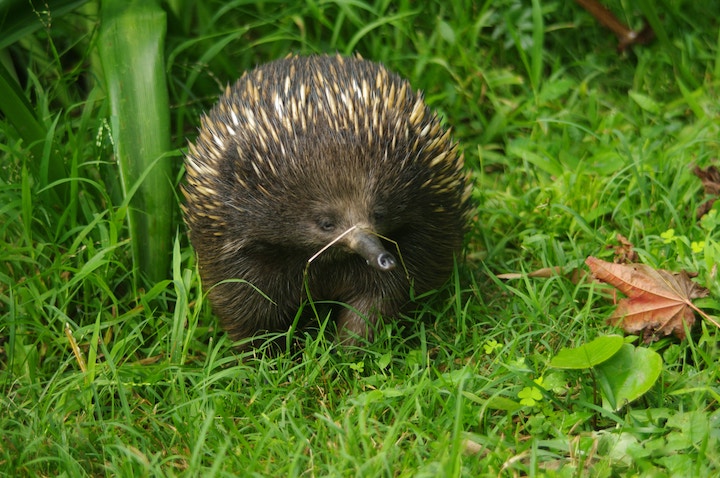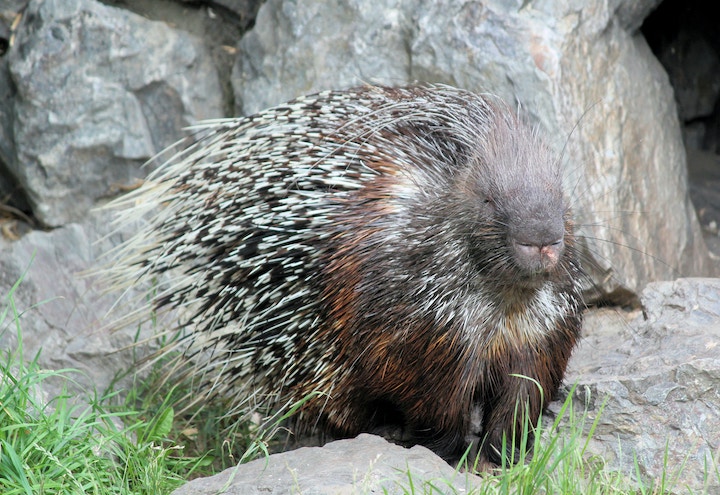Have you ever come across a dead porcupine on your path? While this may seem like a random and unfortunate encounter with a small, prickly animal, there is actually a deeper mystical significance behind it. In many cultures and belief systems, animals hold symbolic meaning and can serve as messengers or omens from the spiritual realm. So what does a dead porcupine represent when it appears on your path?
Let’s explore the mystical significance of the dead porcupine meaning and what it could mean for your life’s journey. Whether you believe in the spiritual realm or not, this is a fascinating topic that will make you think twice the next time you see a dead porcupine on the side of the road. So let’s dive in and uncover the hidden meanings behind the presence of a dead porcupine in our lives.
Key Takeaways
- A dead porcupine encounter has spiritual significance, urging self-reflection, release of past wounds, and embracing vulnerability.
- It prompts balance in self-protection and forming genuine connections.
- Its symbolism resonates with various cultures worldwide, marking transformation, protection, and spiritual guidance.
- In Shamanic practices and astrology, a dead porcupine signifies deep transformation and personal evolution.
- Dreaming of a dead porcupine can highlight the need to establish healthy boundaries and release emotional baggage.
- As a spirit animal, the porcupine teaches resilience, introspection, and the importance of authentic vulnerability.
Dead Porcupine Meaning
The sight of a dead porcupine on your path may initially seem morbid or unsettling, but it carries a deep spiritual meaning that can offer profound insights into your own journey. When we delve into the spiritual symbolism behind encountering a dead porcupine, we begin to understand the valuable lessons it holds for us.
Here are five spiritual meanings behind a dead porcupine:
1. Reflection on self-defense: The porcupine’s quills serve as a physical shield, protecting it from potential threats. The presence of a dead porcupine urges us to reflect on our own self-defense mechanisms. Are we guarding ourselves too fiercely, pushing others away? Or are we not assertive enough, allowing others to take advantage of our vulnerability? The dead porcupine reminds us to find balance in our self-protection strategies, ensuring we protect ourselves while maintaining healthy connections with others.
2. Release of old wounds: Just like the porcupine sheds its quills, encountering a dead porcupine prompts us to release past hurts and resentments. It signifies the end of a defensive mindset and opens the door for growth and transformation. By forgiving and letting go of emotional burdens, we create space for new experiences and relationships to enter our lives.
3. Embracing vulnerability: The porcupine’s quills represent the armor we put up to protect ourselves from emotional pain. However, true connection and growth can only occur when we allow ourselves to be vulnerable. The sight of a dead porcupine urges us to break down the barriers that prevent us from forming deep and meaningful connections with others. It invites us to step out of our comfort zones and embrace the beauty and vulnerability of authentic relationships.
4. Catalyst for introspection: Encountering a dead porcupine on our path serves as a catalyst for introspection and self-reflection. It encourages us to explore our own emotions and confront aspects of ourselves that we may have been ignoring or suppressing. By delving into the depths of our souls, we can uncover hidden strengths and unlock our full potential.
5. Finding balance in self-protection: The porcupine’s quills serve as a physical barrier, deterring potential threats. When we encounter a dead porcupine, it is a reminder to reevaluate our self-protection and boundary-setting strategies. Are we too guarded, pushing others away? Or are we too open, allowing others to take advantage of our vulnerability? The dead porcupine asks us to find a balance, protecting ourselves while still forming genuine connections.

Dead Porcupine Symbolism
The symbolism of a dead porcupine goes beyond its spiritual meaning and reaches into the realm of symbolism. While the spiritual significance of encountering a dead porcupine is focused on personal growth and introspection, the symbolism associated with it encompasses a broader perspective. Here are five unique and uncommon dead porcupine symbolism:
1. Transformation and rebirth: The shedding of a porcupine’s quills represents shedding old habits, beliefs, and patterns. Encountering a dead porcupine symbolizes the opportunity for profound transformation and rebirth. It is a sign to let go of what no longer serves you and embrace the changes that will lead to your spiritual evolution.
2. Balance between defense and vulnerability: The quills of a porcupine serve as a physical barrier, deterring potential threats. The sight of a dead porcupine symbolizes the need to find balance in our self-protection and boundary-setting strategies. It reminds us to evaluate if we are too guarded, pushing others away, or too open, allowing others to take advantage of our vulnerability. The dead porcupine asks us to find a balance that allows us to protect ourselves while still forming genuine connections.
3. Healing and releasing past wounds: Just as the porcupine sheds its quills, encountering a dead porcupine represents the opportunity to release past hurts and resentments. It signifies the end of a defensive mindset and opens the door for healing and transformation. By forgiving and letting go of emotional burdens, we create space for new experiences and relationships to enter our lives.
4. Protection and guidance from the spirit world: In various cultures, the dead porcupine is believed to carry messages from the spirit world. It serves as a bridge between the physical and spiritual realms, offering wisdom and guidance to those who come across it. Encountering a dead porcupine symbolizes the presence of spiritual protection and guidance in your life.
5. End of a challenging period: In African folklore, the porcupine is associated with resourcefulness and adaptability. The presence of a dead porcupine is seen as a positive omen, indicating the end of a difficult period or the completion of a challenging task. It represents the successful overcoming of obstacles and the entrance into a new phase of growth and prosperity.
Also Read – Porcupine Spiritual Meaning, Symbolism, and Totem
Dead Porcupines in Dreams
Dreams are a fascinating window into our subconscious mind, offering insights and messages that can be both enlightening and mysterious. When it comes to dreaming about dead porcupines, it is important to pay attention to the symbolism and meaning behind these nocturnal visions.
Dreaming of a dead porcupine can have several interpretations, each dependent on the context and emotions experienced within the dream. One possible meaning is that the dream is urging you to confront and release your fears. Just as a dead porcupine symbolizes the shedding of defensive mechanisms, this dream may be a call to let go of your own protective barriers. It may be a sign that it is time to face your insecurities head-on and embrace vulnerability in order to grow and evolve as an individual.
Additionally, dreaming of a dead porcupine could represent the need to address past hurts and resentments. The porcupine’s shedding of quills in the dream may signify the shedding of emotional baggage. This dream could be encouraging you to release any lingering grudges or negative emotions that are holding you back. By letting go of these burdens, you can open yourself up to new opportunities for healing and personal growth.
Another interpretation of dreaming about a dead porcupine is related to self-reflection and introspection. The dream may be a gentle nudge from your subconscious to take a closer look at your emotions and inner self. It may be encouraging you to delve deeper into your own thoughts, desires, and fears. By taking the time to explore your inner world, you can gain a better understanding of yourself and make positive changes in your life.
Dreaming of a dead porcupine may also symbolize the need for self-protection and boundaries. The quills of the porcupine serve as a protective barrier, and in your dream, they may be a reminder to establish healthy boundaries in your waking life. This dream could be a sign that you need to be more assertive and assert your needs and limits. It may also indicate that you should evaluate if you are overly guarded or too open with others, finding a balance that allows you to protect yourself while still forming genuine connections.
It is important to note that dream interpretation is subjective, and the meaning of a dead porcupine dream may vary for each individual. To gain a deeper understanding of your own dream, consider the emotions, symbols, and events within the dream itself, as well as your own personal associations with porcupines and death. Keeping a dream journal can also help you track patterns and gain further insight into the messages your subconscious is sending.
Overall, dreaming of a dead porcupine can serve as a powerful reminder to explore and address your emotions, release past hurts, establish boundaries, and embrace vulnerability. It is an invitation to embark on a journey of self-discovery and growth, unlocking your full potential as you navigate the realms of both waking and dreaming life.
Porcupine As A Spirit Animal
The porcupine is a unique and fascinating creature that holds deep spiritual significance as a spirit animal. When encountering a dead porcupine on your path, it can also serve as a powerful symbol and guide in your spiritual journey.
As a spirit animal, the porcupine represents several key qualities and lessons. One of the most prominent characteristics of the porcupine is its self-defense mechanism. Just like the porcupine uses its quills to protect itself from harm, the porcupine as a spirit animal teaches us the importance of setting boundaries and defending ourselves when necessary. It reminds us to assert our needs and protect our emotional well-being.
In addition to self-defense, the porcupine also symbolizes patience and perseverance. Porcupines are known for their slow and deliberate movements, teaching us to take our time and approach life with a calm and steady pace. This spirit animal reminds us to stay resilient in the face of challenges and not to rush or force outcomes. By embracing the porcupine’s patient nature, we can cultivate inner peace and navigate life’s obstacles with grace.
The porcupine as a spirit animal also represents the need for self-reflection and introspection. Porcupines are solitary animals that spend a significant amount of time in solitude. This solitude allows them to delve deep into their own thoughts and emotions. Similarly, when the porcupine appears as a spirit animal, it calls upon us to take time for self-reflection and explore the depths of our own souls. It encourages us to delve into our emotions, confront our fears, and gain a deeper understanding of ourselves.
Another significant lesson that the porcupine as a spirit animal offers is the importance of embracing vulnerability. Despite their quills and defensive nature, porcupines are gentle and sensitive creatures. They remind us that true strength lies in being authentic and vulnerable with others. By letting down our guard and exposing our true selves, we can form deeper and more meaningful connections with those around us.
The porcupine as a spirit animal also teaches us about balance and finding harmony in our lives. Just as the porcupine strikes a balance between self-defense and openness, it encourages us to find equilibrium in our relationships, work-life balance, and self-care practices. By finding this balance, we can experience a sense of fulfillment and live a more harmonious and fulfilling life.

Dead Porcupine In Various Cultures
The spiritual significance of encountering a dead porcupine on your path extends beyond personal introspection and symbolism. In various cultures around the world, the dead porcupine holds its own unique meaning and plays a role in folklore and belief systems.
In Native American cultures, the porcupine is seen as a symbol of protection and self-defense. The quills of the porcupine are believed to possess spiritual power and are often used in rituals and ceremonies to ward off evil spirits and negative energies. When encountering a dead porcupine, Native American traditions suggest that it is a sign of the spirit world trying to communicate with you, offering protection and guidance in your life.
In African folklore, the porcupine is revered for its resourcefulness and adaptability. It is often associated with wisdom and the ability to navigate through challenges with grace and resilience. The presence of a dead porcupine is believed to signify the end of a difficult period or the completion of a challenging task. It is seen as a positive omen, indicating that you have successfully overcome obstacles and are now entering a new phase of growth and prosperity.
In some Asian cultures, the porcupine is considered a symbol of good fortune and prosperity. It is believed that the porcupine’s quills attract wealth and abundance. In these cultures, coming across a dead porcupine is seen as a fortunate occurrence, indicating that financial success and opportunities are on the horizon.
In Celtic mythology, the porcupine is associated with the concept of transformation and rebirth. The shedding of its quills represents the shedding of old habits, beliefs, and patterns. Encountering a dead porcupine in Celtic cultures is seen as a sign of personal growth and the opportunity for profound transformation. It is a reminder to let go of what no longer serves you and embrace the changes that will lead to your spiritual evolution.
In the spiritual practices of ancient indigenous tribes in the Americas, the porcupine is often regarded as a sacred animal. The dead porcupine is believed to carry messages from the spirit world, serving as a bridge between the physical and spiritual realms. It is seen as a spiritual guide, offering wisdom and guidance to those who come across it.
In conclusion, encountering a dead porcupine on your path not only holds personal significance but also resonates with various cultural and spiritual beliefs. Whether it be Native American traditions, African folklore, Asian cultures, Celtic mythology, or the spiritual practices of ancient indigenous tribes, the dead porcupine symbolizes protection, transformation, prosperity, and spiritual guidance. By understanding the diverse meanings attached to the dead porcupine, we can gain a deeper appreciation for its spiritual significance and the messages it brings to our lives.
Dead Porcupine In Shamanic Practices
In Shamanic practices, the encounter with a dead porcupine carries profound spiritual messages. Shamanism views the world as a weave of physical and spiritual realities, where animals, alive or dead, play a crucial role in connecting us with the spiritual realm. Shamans, as spiritual mediators, regard each animal encounter as a sign carrying significant meaning.
When a Shaman encounters a dead porcupine, it is often considered a powerful omen, marking a transitional period of deep transformation and personal evolution. In this context, the dead porcupine serves as a guide leading the way to shedding old beliefs, fostering inner growth, and facilitating spiritual awakening.
The dead porcupine in Shamanic practices can also symbolize the need for introspection and self-discovery. It invites us to journey into our deepest selves, exploring our fears, dreams, and hidden aspects that might have been previously overlooked. This journey can help us discover our spiritual potential and better understand our life’s purpose.
Additionally, the porcupine’s quills in Shamanic practices are often seen as symbolic tools, carrying the energy of protection and boundaries. These quills serve as reminders of the need to protect our spiritual energy, maintain our personal boundaries, and defend our authentic self from external influences that may disrupt our spiritual journey.
However, the quills also embody the necessity of releasing past hurts and resentments, just as the porcupine sheds its quills. They symbolize the letting go process, encouraging us to shed emotional baggage that hinders our spiritual growth.
Shamans may utilize porcupine quills in their practices, as tools in ceremonies or rituals for healing, protection, and releasing old patterns. These practices acknowledge the spiritual significance of the dead porcupine and allow for a deeper connection with its transformative energy.
It’s crucial to remember that while Shamanic interpretations provide fascinating insights into the spiritual meaning of a dead porcupine, these teachings invite us to further explore our personal understanding and spiritual relationship with this intriguing creature.
Check Out – Porcupine In Dream: Unveil The Hidden Truth
Porcupine In Astrology
In the field of astrology, animal symbols and their traits can deeply influence our understanding of the celestial bodies and their impact on our personalities and lives. The porcupine, with its unique characteristics, can provide us with insightful lessons in astrological interpretation.
In astrology, the porcupine symbolizes self-protection, introspection, and the balance between vulnerability and defense, resonating particularly with the signs of Cancer and Capricorn. These two signs sit opposite each other on the zodiac wheel, embodying the tension between inner and outer worlds, and the struggle to find equilibrium.
Cancer, a water sign, is often associated with emotions, sensitivity, and nurturing, just like the porcupine with its tender, vulnerable side beneath its quills. Cancer’s natural instinct is to protect themselves and their loved ones, mirroring the porcupine’s instinctual use of quills for self-defense. This sign can learn from the porcupine’s ability to balance vulnerability and protection, teaching them not to over-guard their emotions and to allow for deeper connections.
On the other hand, Capricorn, an earth sign, mirrors the porcupine’s capacity for self-reliance and resilience. Known for their disciplined and ambitious nature, Capricorns can relate to the porcupine’s resourcefulness. The encounter with a dead porcupine can remind Capricorns to pause, release the burden of old patterns, and embrace personal transformation for growth.
Astrologically, a dead porcupine appearing in your life might coincide with significant planetary transits or aspects that urge introspection, emotional release, and transformation. This could be during periods when the moon is in Cancer, provoking emotional introspection, or when Saturn, the ruling planet of Capricorn, is prominent, calling for release and transformation.
Therefore, the porcupine, alive or dead, serves as a potent symbol in astrology, offering guidance and insight into our spiritual journey as we navigate the cosmic influences in our lives.

Conclusion
It’s undeniable that the dead porcupine’s presence carries significant mystical and spiritual implications. Although the sight of a dead porcupine may initially evoke discomfort or apprehension, it’s critical to recognize the profound teachings this unique creature provides us.
The porcupine, in its departure from the physical world, compels us to confront our own defenses, encourages the release of past wounds, invites us to embrace vulnerability, and stirs introspection. More so, it nudges us to balance our self-protection and connection with others – a vital lesson in navigating our journey of personal growth and transformation.
Whether it’s in dreams or physical encounters, the spiritual significance of a dead porcupine resonates with many cultures worldwide and is recognized in shamanic practices and astrology, further amplifying its influence. And while the meanings discussed in this blog post offer general guidance, it’s essential to remember that the dead porcupine’s symbolism can be personal and subjective, drawing from your own life experiences and spiritual beliefs.
So, the next time you come across a dead porcupine on your path, instead of turning away, take a moment to pause and reflect on its spiritual message. Remember that it is not a sign of death or misfortune, but rather a potent symbol of transformation, healing, protection, and spiritual guidance. In its quiet and unassuming way, the dead porcupine offers profound wisdom, urging us to delve deeper within ourselves and embark on a journey of self-discovery and growth. May we honor its teachings and navigate our paths with newfound understanding and insight.
Frequently Asked Questions
- Is encountering a dead porcupine a bad omen?
Not at all. Though it might initially feel unsettling, coming across a dead porcupine is seen as a significant spiritual symbol, representing introspection, transformation, healing, and protection. It’s an opportunity for growth and self-discovery.
- What should I do if I dream of a dead porcupine?
It’s important to reflect on your dream and understand the emotions and scenarios it presented. Such dreams often urge us to establish healthy boundaries, release past hurts, or embrace vulnerability. Consider maintaining a dream journal to keep track of recurring patterns or themes.
- I’m a Cancerian, what does a dead porcupine mean for me?
As a Cancerian, you may resonate with the porcupine’s instinctual need to protect itself. The dead porcupine invites you to balance self-protection and vulnerability, allowing for deeper connections with others.
- How does a dead porcupine link to Shamanic practices?
In Shamanism, a dead porcupine is viewed as a powerful omen, marking a period of deep transformation and evolution. It’s seen as a guide, encouraging introspection and self-discovery.
- Does the symbolism change based on the culture?
Yes, different cultures attach various meanings to the dead porcupine. From symbolizing protection in Native American culture to marking the end of a challenging period in African folklore, the symbolism can widely vary. It’s always best to interpret the symbolism in a way that resonates with your personal beliefs and experiences.

